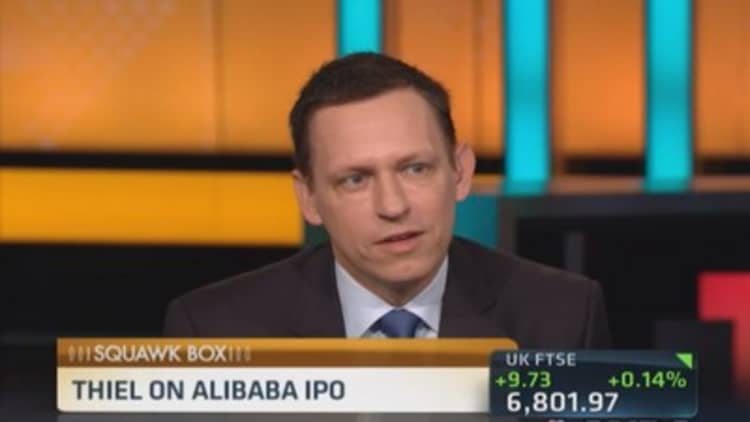Despite all the excitement surrounding Alibaba's IPO, the company is likely to experience significant growing pains as is expands beyond China and into new businesses, industry experts say.
The Chinese e-commerce giant is expected to rake in more than $20 billion from its potentially record-breaking IPO, which will help fuel the company's ambition of growing outside of China and beyond e-commerce.
Read MoreIs Alibaba coming to America?
But to successfully become a global player, the company will need to adapt its business to countries with more robust competitive landscapes and make sense of its dizzying array of investments at home and abroad.
Leaving China
For one thing, doing business outside of China is very different from doing business within its border.
So far, the company has operated in something of a bubble. China's rapid growth, burgeoning middle class and dramatically underdeveloped retail infrastructure have enabled the company to become the behemoth it is. In addition, the Chinese government largely restricts U.S. competitors from operating on a level playing field in the country.
"I don't think people understand how underdeveloped the retail infrastructure is in China. They aren't necessarily winning these customers because they have great service," said Max Wolff, chief economist at Manhattan Venture Partners.
Read MoreAlibaba won't pull page from Facebook IPO, but is it safe?
"They are winning them because a lot of the population is new to the middle class, and if you aren't in a big city, this is your big option to join the consumer economy. You are selecting it because it's the default setting."

So to grow on a global scale--especially in developed markets like the U.S., where e-commerce competitors already have deep roots, it must rethink its core strategy.
"Alibaba accounts for 80 percent of the Chinese e-commerce traffic, I don't see them being 80 percent of e-commerce elsewhere," Wolff said. "They need to figure out a different business model elsewhere."
Buying in the U.S. and beyond
While the IPO filing doesn't go into specifics about its global strategy, some of the company's investments and acquisitions show it's already thinking beyond e-commerce and China.
In the U.S., the company has been on an aggressive shopping spree, investing $16 billion in an array of start-ups since 2011, according to a recent report from Manhattan Venture Partners. (In the last year alone, it has invested $1 billion in start-ups.)
Read MoreMaking sense of Alibaba's shopping spree
Those companies are all over the map, including ride-sharing company Lyft ($250 million), San Francisco-based mobile gaming company Kabam ($120 million), and smart remote control company Peel (adding $5 million to its initial investment in June).
Another area of interest: messaging apps. Earlier this year, the company invested $215 million in the mobile messaging company Tango and at one point was even reported to be in discussions with SnapChat, as well as the messaging app WhatsApp, before it was acquired by Facebook, Wolff said.
Alibaba Group U.S. Investments
| Company | Description | Amount | Date |
|---|---|---|---|
| Kabam | Mobile gaming developer | $120M | 14-Aug |
| Peel | Smart TV remote control | $5M | 14-Jun |
| Lyft | On demand ride-sharing | $250M | 14-Apr |
| Tango | Social messaging, voice and video app | $280M | 14-Mar |
| 1stdibs | eCommerce website for luxury goods | $15M | 14-Jan |
| ShopRunner | Members-only shopping service offering two-day free delivery | $206M | 13-Oct |
| Quixey | Search engine for mobile apps | $50M | 13-Oct |
| ShopRunner | Members-only shopping service offering two-day free delivery | $75M | 13-Aug |
| Fanatics | eCommerce website for official licensed sports merchandise | $170M | 13-Jun |
| Peel | Smart TV remote control | $20M | 13-Apr |
Source: Source: CB Insight
Despite the range of investments in new businesses, the company is still investing heavily in e-commerce, both in China and abroad.
In August, Alibaba launched an e-commerce platform in the U.S. called 11main.com, which is aimed at serving small to medium size businesses. And one of Alibaba's most significant U.S. investments is its stake in ShopRunner, a members-only shopping site that offers benefits like two-day shipping.
Read MoreAlibaba's US spending spree opens global doors for start-ups
The company will likely continue to make strategic investments in logistical companies like ShopRunner in order to beef up its defense against other e-commerce giants in the U.S. like Amazon, said Zia Daniell, a vice president and research director for e-business at Forrester Research.
But don't expect Alibaba to pose any serious competition to U.S. companies anytime soon, she added.
"It's a sexy story to tell they are going to come in and displace the big e-commerce players, but that's not happening anytime soon," Daniell said.
Read More
Still room to grow in China
For the foreseeable future most of its growth is still going to come from China, Wolff said.
"When your country has 15 percent of the population and 500 million of those people have not been online, you can grow for some time," Wolff said.
During the past two years, the company has rolled out versions of Taobao, its consumer to consumer e-commerce marketplace, in Hong Kong and Taiwan.
Media investments seem to be big on Alibaba's radar, said Kelland Willis, an e-commerce analyst at Forrester Research.
In June, it invested $80 million in the Chinese media conglomerate 21st Century Media, and in April it sunk $1.2 billion into YokuTudou, which is China's YouTube, as well as $1.05 billion in the media group Wasu Media & Network.
"There's high demand for good content in China right now. A lot of businesses don't know how to sell in home entertainment. It's a really strong opportunity," Willis said.
The company will also likely continue to pour money into mobile investments in the region to help it to better compete with with its rival Tencent, which has a strong footing in mobile payments and mobiles messaging, analysts said.
So, what is the company looking to do with their diverse array of investments?
"We don't know yet what their top priority will be ... and we won't know until after the IPO and they start becoming more transparent with some of these plans," Daniell said. "It's all pretty unclear at this point."
Read MoreHow 'Made in the USA' stands out on Alibaba
But just because we can't connect the dots doesn't mean Alibaba doesn't have a plan, said Bryan Stolle, a general partner at Mohr Davidow Ventures.
"It's always been a part of Chinese culture for thousands of years to be long term planners," Stolle said. "They aren't confused at all about what they are doing and how they are going to be doing it. They have a plan and they are working out their plan."
—By CNBC's Cadie Thompson
—Correction: This story has been updated to reflect the correct about of money Alibaba has invested in U.S. companies in the last year.





